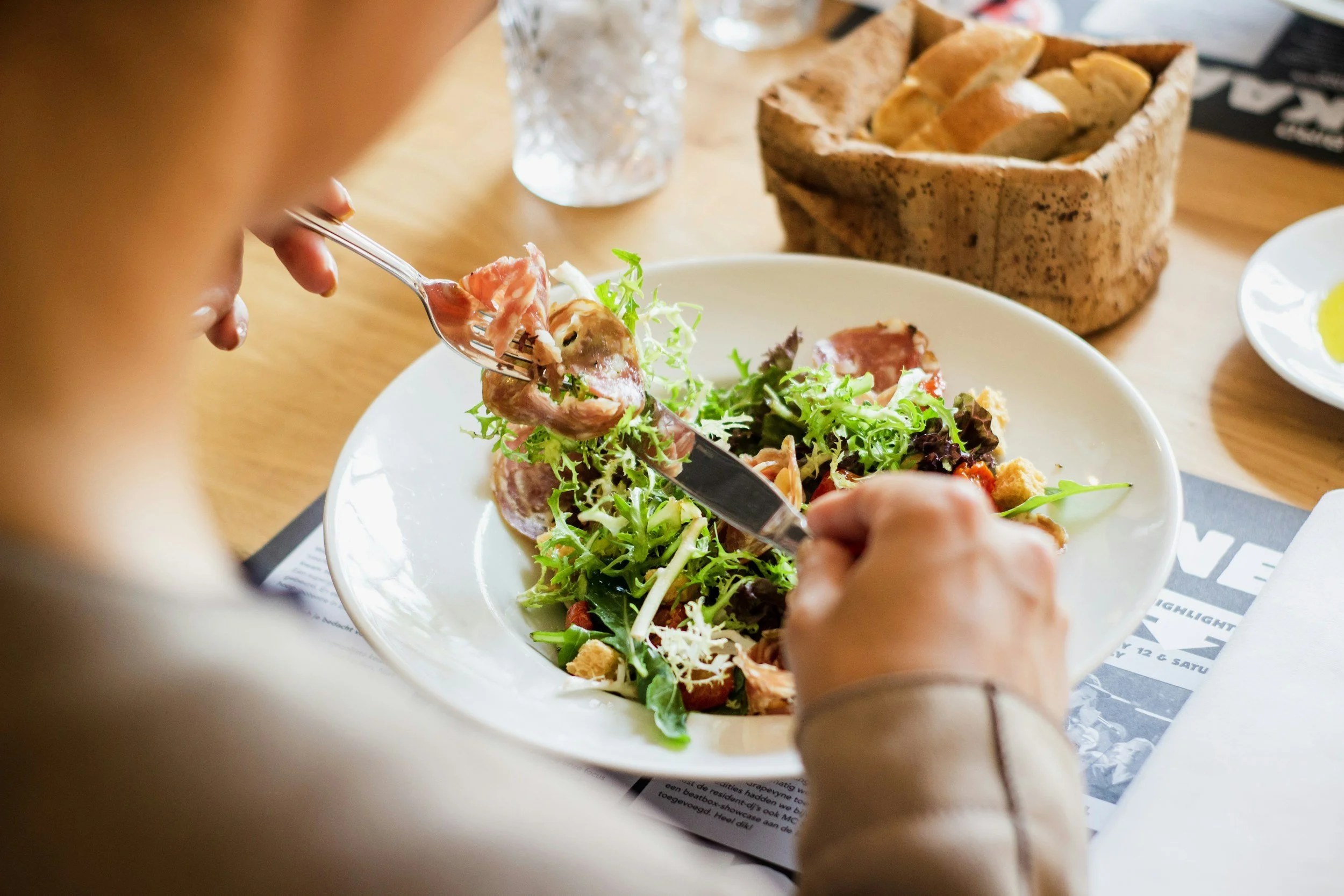Trauma and Intuitive Eating: A Guide to Healing Your Relationship with Food
Hi, I’m Stevie and I’m a Somatic Experiencing Practitioner as well as a certified Intuitive Eating counselor in Kansas City. One of my niches as a therapist is helping people address trauma in their bodies and the many ways that can manifest, one of them being in their relationships with food. What I hope to provide today is a more nuanced understanding of how trauma impacts the ability to nourish oneself, and the path to healing that relationship with food through Intuitive Eating. (This is not a substitute for medical care, of course.)
What Is Intuitive Eating and How Does It Work?
A Trauma-Informed Approach to Intuitive Eating
Intuitive Eating is a self-nourishment framework created by Evelyn Tribole and Elyse Resch which has ten principles geared towards helping each person liberate themselves from diet culture, find full food freedom without the guilt and mind chatter, and nourish themselves. Intuitive Eating heavily emphasizes the need to make decisions for our bodies based off of internal cues as opposed to external cues. It is not a “just eating whatever you want” or a “hunger and fullness diet,” but rather a nuanced approach that takes into account many different factors, and ultimately can help with trauma healing.
The 10 Principles of Intuitive Eating
For a full list of the key principles of Intuitive Eating, click here.
Reject the Diet Mentality
Honor Your Hunger
Make Peace with Food
Challenge the Food Police
Discover the Satisfaction Factor
Feel Your Fullness
Cope with Your Emotions with Kindness
Respect Your Body
Movement—Feel the Difference
Honor Your Health—Gentle Nutrition
How Trauma Disrupts Your Relationship with Food and Body Awareness
When we experience trauma, it impacts us not only emotionally, but physically as well. Depending on the nature of the trauma, our bodies can get stuck in fight, flight, or freeze. This is where trauma-informed therapy becomes essential for healing.
I have written a full blog on the fawn response which will be helpful to read, especially if you have developmental trauma or relationship trauma.
Read About The Fawn Response >
How Trauma Affects Your Digestive System
Being in a hyperaroused or hypoaroused state stresses the digestive system, either shutting it down or creating digestive disorders (like IBS). Hyperarousal is another word for fight or flee, and hypoarousal is another word for shut down/freeze. When an animal (and I am including us in this category) needs to exit really quickly or fight, it can oftentimes be advantageous to evacuate their bowels, making them lighter and lessening the load on their digestive systems and the energy it takes to make that happen. On the other side of the coin, if there is a freeze in the system, it is advantageous for the body to halt the digestive system. This is important to note as we are taking a look at how trauma and being stuck in fight, flight, or freeze, would impact hunger and fullness cues.
What Is Interoception and Why Does It Matter for Intuitive Eating?
If the trauma is bad enough, it can impact our interoception. Interoception is a fancy word for being able to understand or feel how our body is doing on the inside. It is the ability to read and hone in on internal cueing. (Read about how to improve your interoception skills here.)
Interoception is a key piece of the Intuitive Eating experience. Somatic therapy and Intuitive Eating both rely on this “bottom-up” approach; the ability to tune into the body and use that to inform next steps, instead the intellect calling all of the shots. Interoception allows people to know when they are hungry, when they are full, when they are eating emotionally, and so on.
Signs Trauma Is Affecting Your Eating Habits:
Emotional eating to self-regulate quickly
Using food restriction as a way to maintain control
Feeling disconnected (disassociated) from the body’s hunger and fullness cues
Body dysmorphia – feeling surprised by how you look because of the amount of time feeling disembodied altogether
Intense shame around your body or the way you feed yourself
*This is not an exhaustive list, but common ways that I see clients struggle after trauma.
How Diet Culture Can Cause Trauma Responses
The Harmful Parallels Between Diet Culture and Trauma
Diet culture, in many ways, can either re-traumatize clients or be the trauma in and of itself. If you think about it, diet culture has many similar characteristics of an abuser.
How Diet Culture Mimics Abusive Patterns:
Seeks control through making you doubt yourself
Creates hypervigilance in the nervous system (Will this be bad for me? Did I gain weight?)
Molds behaviors and self-beliefs through shame
Takes away your ability to think clearly
“Failing” a diet is emotionally draining
All of these are common, and not to mention the actual physical trauma of overly-restricting food can have on a person. It takes away vital nutrients from the brain, and sends the system into fight or flight mode because it doesn’t know when it is going to be fed again. In this way, dieting can unknowingly reinforce the trauma patterns happening in the body and people can feel triggered without knowing why. Learning to regulate your nervous system is a crucial part of healing this relationship.
Using Intuitive Eating as a Trauma Recovery Tool
Intuitive Eating helps heal trauma by putting you in control, which may be one of your first experiences of taking power back in a healthy way.
The number one way Intuitive Eating supports trauma healing is this: body trust and safety. Without the body feeling safe to be in, trauma healing becomes impossible. Trauma healing requires the ability of the nervous system to have a safe place to “land”. If a person has spent years disembodied and disassociated, then coming back into themselves can be very scary, especially if a broken relationship with food is at play. This is why we combine Intuitive Eating counseling with somatic therapy at Embodied Healing KC.
Intuitive Eating puts you in control, which can be some people’s first experiences of taking power back in a healthy way. It also helps clients more deeply attune to their bodily needs and meet them in a gentle way, which is an important part of the reparenting process for many. This new framework for feeding oneself and moving ones body helps to support full body autonomy and creative exploration, allowing for vitality to come into the system. Intuitive Eating is a truly beautiful way to help people come back to themselves after years of being disconnected from themselves and feeling shame about it.
Practical Steps to Begin Intuitive Eating After Trauma
Here are a few small ways you can begin to integrate Intuitive Eating into your life and start healing your relationship with food. We highly recommend reaching out to a trauma-informed therapist or a dietician for support as well! (Is your therapist trauma-informed? Here’s how to tell.)
Ground before meals (take time to relax, notice your surroundings, and feel present)
Notice (rather than judge) your food behaviors (it is all data!)
Exercise your interoceptive awareness to check in on hunger and fullness cues
Eat in an environment that feels safe to your body
I also like to refer my prospective clients to this questionnaire which helps people to identify where their strengths and areas for improvement are in terms of their ability to intuitively eat.
Common Challenges When Practicing Intuitive Eating After Trauma
Feeling Disconnected from Your Body
Because people who have unresolved trauma oftentimes find themselves feeling numb, they can have a hard time feeling their bodies and knowing what it wants. That’s why creating small ways to connect in the beginning of the work is so important. It might feel like things start really slow, and that is okay. What is most important is your body safety and autonomy. People in this category often find themselves zoning out or disassociating in other ways. This pattern is simply reflected in the mind/body connection. EMDR therapy can be particularly helpful for processing trauma that keeps you disconnected from your body.
Navigating Emotional Eating Patterns
People find that if they are emotional eaters, it is difficult to feel progress with Intuitive Eating. That is why doing the trauma work at the same time is key; it helps the person to be able to regulate in order to find other ways to cope. Please note that emotional eating is not always problematic and shouldn’t be pathologized. We eat all the time for cultural reasons – celebrations, holidays, and even funerals. The term “soul food” exists for a reason. Talk therapy can provide additional support for understanding emotional eating patterns.
Struggling with Control and Hypervigilance
Being hypercontrolling is the same way – just the nervous systems way of finding a sense of peace and autonomy over the body. This can, again, feel like Intuitive Eating isn’t within reach. I assure you, that with good, trauma-informed support, it is.
Letting Go of Perfectionism in Your Healing Journey
Here’s one pitfall I constantly see my clients fall into – not recognizing how far they have come. Not in some pollyanna way, but to really find some encouragement that they are making strides. The important thing to remember is that healing is not, and will never be, linear. You might find that one day you really grasp the principles, and then a life stressor happens or your trauma gets triggered and you struggle a bit more. That is normal. This isn’t a diet, perfection isn’t required. Learning and collecting data is all that you need to do.
Bottom line – anybody can be an intuitive eater!
Journaling can be a great first step to start your intuitive eating journey and heal your relationship with food.
Take it Further: Journal Prompts For Your Intuitive Eating Journey
How do I know I am starting to get hungry?
How do I know I’m starting to get full?
What components of a meal or snack help me to feel satisfied?
How do I experience safety in my body?
What emotions come up for me around food?
What food rules no longer serve me now?
What is an easy, safe way to connect to my body?
Frequently Asked Questions About Trauma Healing and Intuitive Eating
-
Trauma can disconnect you from your body’s internal cues, making it hard to recognize hunger, fullness, or satisfaction. It can also lead to emotional eating, restriction, or control-based food behaviors.
-
Yes. Emotional eating is common among trauma survivors, and intuitive eating helps you explore those patterns with self-compassion while developing new ways to regulate emotions and meet your needs.
-
Body trust helps you feel safe inside your own body. Without it, trauma work and intuitive eating can feel overwhelming. Rebuilding trust is essential for sustainable healing and nourishment.
-
Begin by grounding before meals, checking in gently with your body, and working with a trauma-informed therapist. Start slow and treat each moment as data, not a judgment.
-
Yes. Diet culture reinforces trauma through shame, control, and disconnection. It often mimics abusive dynamics, which can retraumatize individuals who’ve experienced emotional, physical, or psychological harm.
Stevie Olson-Spiegel is a Licensed Therapist and Somatic Experiencing Practitioner located in Kansas City. She uses Somatic Experiencing as her main body-based trauma healing modality, as well as EMDR. As an Intuitive Eating Counselor, she uses these principles to help her clients challenge their relationship with their cultural misconceptions about their body and food.








